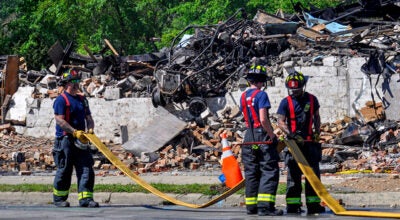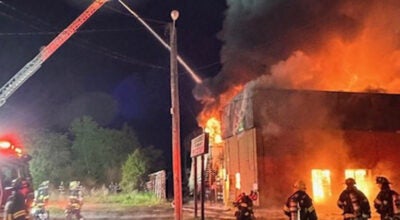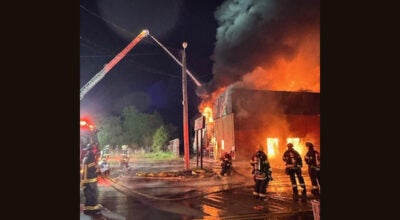CDC issues new eviction moratorium
Published 7:06 pm Thursday, August 5, 2021
|
Getting your Trinity Audio player ready...
|
The Centers for Disease Control and Prevention this week issued another eviction moratorium that was welcomed by those in precarious rental housing situations, along with advocates, even as its constitutionality came into question.
The moratorium is similar to, though not the same as, the one that expired July 31. The new one, issued Aug. 3, keeps the following provisions: that the renter must not have earned more than $99,000 in 2020 or $198,000 if they file taxes jointly, the renter cannot make a full payment due to a significant loss of income due to job loss, pay cut or high medical bills, the renter has to have made an effort to pay rent, and the renter will likely be homeless if evicted.
The new provision in the latest moratorium is that the renter lives in an area with a “high” or “substantial” rate of COVID-19, per CDC guidelines.
“The eviction moratorium allows additional time for rent relief to reach renters and to further increase vaccination rates. In the context of a pandemic, eviction moratoria — like quarantine, isolation and social distancing — can be an effective public health measure utilized to prevent the spread of communicable disease,” the CDC said in a statement.
A summary of the new moratorium states: “The U.S. Centers for Disease and Control is issuing a new order temporarily halting evictions in counties with heightened levels of community transmission in order to respond to recent, unexpected developments in the trajectory of the COVID-19 pandemic, including the rise of the Delta variant. It is intended to target specific areas of the country where cases are rapidly increasing, which likely would be exacerbated by mass evictions. Accordingly, subject to the limitations under “Applicability,” a landlord, owner of a residential property, or other person with a legal right to pursue eviction or possessory action, shall not evict any covered person from any residential property in any county or U.S. territory while the county or territory is experiencing substantial or high levels of community transmission of SARS-CoV-2.”
CDC Director Dr. Rochelle Walensky said the emergence of the COVID-19 delta variant “has led to a rapid acceleration of community transmission … especially if they are unvaccinated.”
“This moratorium is the right thing to do to keep people in their homes and out of congregate settings where COVID-19 spreads,” Walensky said in a statement.
The previous moratorium had expired July 31 amid criticism that President Joe Biden chose at the time not to extend the moratorium, citing a U.S. Supreme Court ruling late last month saying the CDC needed congressional authorization to extend the moratorium. The White House had called for states and localities to enact their own moratoriums to protect people facing eviction.
President Joe Biden said during a press conference Aug. 3, hours before the CDC’s announcement, that any call for a moratorium based on the Supreme Court’s recent decision likely faces obstacles. He urged states to distribute the billions of dollars in federal money they have received to landlords to help prevent evictions.
But he offered a mixed answer on whether the CDC’s new guidance would pass constitutional muster.
“The bulk of the constitutional scholarship says that it’s not likely to pass constitutional muster … but there are several key scholars who think that it may and it’s worth the effort,” Biden said.
However, he said it would buy time to distribute more of the money in rent relief to landlords.
“At a minimum, by the time it gets litigated, it will probably give some additional time while we’re getting that $45 billion out to people who are, in fact, behind in the rent and don’t have the money,” Biden said. “That’s why it was passed in — in the act that we passed in the beginning of my administration, and it went to the states.”
He said his administration thought states were expediting the money to the landlords. However, while Virginia has been among the country’s leaders in distributing money to landlords — about $300 million of $1 billion the state received — some states, including New York, had not distributed any of their allotment.
Amy Disel Allman, director of advocacy for the Virginia Legal Aid Society in Suffolk, welcomed the news.
“The extension of the moratorium will help delay the flood of evictions and give landlords and tenants a chance to work together to get the Rent Relief Program (money) that is intended for them,” Allman said in an email. “It’s ready and waiting and we need to use it. Hopefully, this extension will encourage more landlords and tenants to do it.”
Rep. Bobby Scott (D-Newport News), who represents all of Franklin and parts of Suffolk, said the votes were not there for congressional action on extending the previous moratorium.
“The legislative branch could have done it,” Scott said at a Suffolk National Night Out event Aug. 3 at King’s Fork High School. “But I think they counted the votes, and a lot of special interests were against it. I wasn’t counting the votes, but I don’t think we had the votes.”
Allman said landlords and tenants alike have largely been unaware of the program, but Scott countered the notion that landlords didn’t know about it.
“How’s a landlord not going to know? You’re running a business,” Scott said, “and it’s about to go broke, and doesn’t know the money’s sitting there waiting for his application? Now does he belong to the realtor’s association? If you’re in business, you belong to these organizations. … And so the landlords should know if they’re involved at all. The tenants, from what I understand, have been a little bit slow, and the paperwork, there’s too much red tape.”
Scott said the eviction crisis predates the pandemic, noting a study from Princeton University in 2016 that ranked five Virginia cities among the top 10 in eviction rates, including Chesapeake, Norfolk, Hampton and Newport News.






